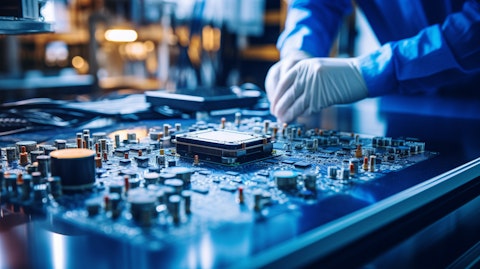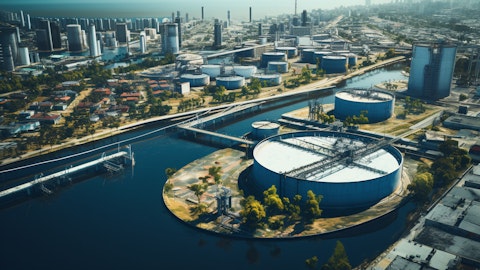Genasys Inc. (NASDAQ:GNSS) Q2 2025 Earnings Call Transcript May 13, 2025
Genasys Inc. misses on earnings expectations. Reported EPS is $-0.14 EPS, expectations were $-0.13.
Operator: Good day, ladies and gentlemen, and welcome to the Genasys Fiscal Second Quarter 2025 Results Conference Call. All lines have been placed on a listen-only mode, and the floor will be open for questions and comments following the presentation. [Operator Instructions] At this time, it is my pleasure to turn the floor over to your host, Brian Alger, SVP, Investor Relations and Corporate Development. Welcome, Brian. The floor is yours.
Brian Alger: Good afternoon. Welcome to Genasys’ fiscal 2025 second quarter results conference call. I’m Brian Alger, SVP, Investor Relations and Corporate Development for Genasys. With me on the call today are Richard Danforth, our CEO; and Dennis Klahn, the company’s CFO. During today’s call, management will make forward-looking statements regarding the company’s plans, expectations, outlook, and future financial performance that involves certain risks and uncertainties. The company’s results may differ materially from the projections described in these forward-looking statements. Factors that might cause such differences and other potential risks and uncertainties can be found in the risk factors section of the company’s Form 10-K for the fiscal year ended September 30, 2024.
Other than statements of historical facts, forward-looking statements made on this call are made based on information and management’s expectations as of today, May 13, 2025. We explicitly disclaim any intent or obligation to update those forward-looking statements except as otherwise specifically stated. We will also discuss non-GAAP financial measures and operational metrics, including adjusted EBITDA, bookings and backlog, which we believe provide helpful information to investors with respect to evaluating the company’s performance. For reconciliation of adjusted EBITDA to GAAP financial metrics, please see the table in the press release issued by the company at the close of market today. We consider bookings and backlog leading indicators of future revenues and use these metrics to support production planning.
Bookings is an internal operational metric that measures the total dollar value of customer purchase orders executed in a given period regardless of the timing of the related revenue recognition. Backlog is a measure of purchase orders received that are scheduled to ship within the next 12 months. Finally, a replay of this call will be available approximately 4 hours through the Investor Relations page on the company’s website. Now, at this time, it’s my pleasure to turn the call over to the Genasys’ CEO, Richard Danforth. Richard?
Richard Danforth: Thank you, Brian, and welcome, everyone. Fiscal 2025 is turning out to be an exceptional year for Genasys. On our February call, we discussed how the January fires in L.A. brought global attention to the use of Genasys Protect for managing emergency response and evacuation notifications. As we have stated multiple times, the Genasys Protect platform proved to be incredibly resilient and effective at saving lives. The balance of the March quarter progressed largely as expected, the one meaningful LRAD order that was expected to close moved to our fiscal third quarter. Since last November, we have known that the second half of fiscal 2025 was going to see tremendous growth and acceleration in our hardware business.
Throughout the March quarter and continuing into our third fiscal quarter, design, planning, and procurement for the Puerto Rico project has been progressing well. Recently, we began implementation and installation work on the first of 19 dams currently approved. Substantially, all of the materials for the first three groups have either been received or are on order. In Puerto Rico, since the final week of March quarter, we have been expecting the down payment for the third group of dams. The designs have been approved. Our invoices for the down payment have been delivered and approved. All of the authorizations for the payment have been made. We have not yet received the deposit, however. To be clear, this has absolutely nothing to do with FEMA or anything else occurring in Washington, D.C. The FEMA money for the development and installation of the early warning system for the identified 37 dams in Puerto Rico was funded in early 2024.
We have received multiple assurances from our customer that the payment will be made shortly. That said, management and the board made the decision to obtain additional capital to maintain momentum and enable Genasys to capture the opportunity at our doorstep. Because of the timing and various provisions within our existing secure debt agreement, we signed a $4 million first amendment to the term loan with our creditor, Whitebox. This small loan comes at the same interest rate as the original debt, but is intended to be very short-term. In fact, it expires at the end of this calendar year. Additionally, the agreement comes with a statement for the availability of an additional $4 million to be made at Genasys request. Suffice it to say, if we had received the down payment for the third group we would not have sourced the bridge capital.
We continue to drive to an aggressive timeline that delivers all of the hardware for the first three groups to the island by the end of this fiscal year with installation schedules already underway. Dennis will go into the revenue recognition in much greater detail. But hitting the schedule as it stands today, result in record quarterly revenue in the fourth quarter this fiscal year. Beyond the project in Puerto Rico, bookings for LRAD business continue to track ahead of our last year, driving further improvements in our 12-month backlog. This is in spite of a handful of opportunities slipping including the one I just referenced. International and domestic demand continues to improve for both critical infrastructure as well as military needs.
New use cases continue to emerge like a recent article that described the use of LRAD units on autonomous surface vessels in Singapore, or the upgrading of physical security systems like the one we have recently announced for the CIP-14 electrical substation here in the U.S. Looking out a bit further, the project award in Puerto Rico is providing a meaningful proof point in a number of countries looking to provide citizens with reliable emergency communication. Finally, I want to take a moment to talk about CROWS AHD program. Like its predecessor, this program is expected to span multiple years with eventual deliveries of thousands of LRAD units. Based on our conversations with the Army Program Office, we expect to receive the initial production order under this program this fiscal year.
Given that we don’t yet have the purchase order; we cannot state for certain the size of the order nor ability to complete deliveries against that order this fiscal year. However, the importance of this milestone is critical, as it should serve as ballast to our LRAD business for the next several years. We look forward to updating you further, purchase order is issued. Now, I would like to shift gears and speak a little about our software business. As you all are aware, we had a major proof point this past January. While that won’t convert into instant lift in revenues, it has contributed to a number of opportunities. Since the fires within LA County alone, we are in various stages of discussion with three separate communities for implementation of EVAC and acoustic systems.
Nationwide, the performance of the system during the LA complex of fires, as well as the high-profile events in Oklahoma, North Carolina, New Jersey, and even Long Island are contributing to an expanding pipeline. There are still ways from closing and being converted to revenue. This pipeline measurement has increased more than 100% since the beginning of fiscal 2025. Many of you are aware of Congressman Garcia’s recently released a report regarding lessons from the Kenneth Fire false alerts. The event highlighted a breakdown in alert targeting that originated from within a complex environment of rapidly evolving conditions, overlapping systems, and high-stake decision-making during a historic disaster. Importantly, what has not been covered by this investigation, nor in any media reports, are the dramatic improvements Genasys software enabled in quickly disseminating evacuation notices to the public.
During previous devastating wildfires, the elapsed time from first responder requesting evacuations to evacuation alerts being issued averaged 40 to 60 minutes. Using the Genasys Protect platform, LA County reduced the average time to 6 minutes. This significant improvement likely saved hundreds and possibly thousands of lives. What we witnessed was more than just technology at work. It was a culmination of dedication, preparation, and coordination across multiple agencies. Emergency teams sent over 400 zone status changes to critical life-saving situations through Genasys Protect, all in record time. As the report mentioned, a local network-level disruption interfered with data transfer to a federal alerting backbone, IPAWS. The alert was correctly configured by the operator and properly localized across all channels.

Intermittent network issue prevented the targeted area from registering in one channel, resulting in a broader than intended warning. This wasn’t a software failure. It was a breakdown in connectivity in the middle of a crisis. Networks are strained with the unprecedented condition around Los Angeles County. Since that initial incident, we have taken the following actions, implementing new safeguards, strengthening cross-channel validation, and introducing fail-safes to ensure that geo-targeting data is fully aligned or any alert is sensed. These enhancements were live within 48 hours of the original occurrence. Our technology remains the most widely deployed multi-channel alerting platform in California and continues to expand nationwide.
We remain the trusted targeted communication partner to agencies across 39 states with Genasys Protect, and we are expanding rapidly. Our platform is stronger, smarter, and more resilient because of what we’ve learned and we’re only accelerating from here. In addition to the tailwinds for EVAC that have come in the wake of the LA fires, our CONNECT software is rapidly gaining traction with even greater awareness being fueled by the signal gate disclosures. Most CONNECT deals are relatively small from a revenue standpoint. Recently, however, we have been engaged with a number of larger organizations. One is a federal agency, another is a combination of regional agencies in one of the highest populated cities in the United States. Each of these opportunities are currently in trial and are expected to progress to contract.
As strong as the momentum and growth in our pipeline is, we do have to acknowledge that fewer deals are closing. The opportunities are not going away, but rather being delayed. This is particularly true at the state level where access to federal grant money is in question. While some deals are closing, many of the larger Genasys Protect deals, including those with acoustics, have slowed. Up until last Monday, grant payments from the $553 billion Urban Area Security Initiative and the $374 billion State Homeland Security Program were frozen. Our expectation is that that funding becomes more certain deals that are further in our pipeline will accelerate through closing. With that said, we still expect sequential growth in our software business over the remainder of fiscal 2025.
At the macro level, Genasys is not being impacted by the ongoing tariff and trade negotiations. The administration’s rapid pace of change is affecting procurement processes in that it introduces uncertainty into an already complicated process of securing funding, as not only do federal decisions affect federal agencies, but many state budgets rely heavily on the funds from the federal government, thus affecting state appropriation priorities. In summary, fiscal 2025 is challenging to forecast and precisely predict, but it is still on course for substantial growth and improvement in profitability, particularly in the fiscal fourth quarter. Beyond 2025, the outlook continues to improve with a broadening pipeline for both our hardware and software offerings, ultimately delivering increased visibility and predictability.
Now, I will turn the call over to Dennis to go through the financials and outlook in greater details. Dennis?
Dennis Klahn: Thank you, Richard. Before I begin to review the operational and financial details of the quarter, I would like to speak about my decision to retire. I’ve been fortunate to work with companies doing exciting things and learn something new in every organization I served in my 45-year career. Genasys has been an amazing opportunity, both personally and professionally, with rapid organic growth, multiple acquisitions, worldwide expansion, and essentially growing a new software company out of a hardware company. Genasys has a great team of passionate, hardworking, and dedicated employees that have made it a joy to come to the office every day. I want to thank Richard, the board and the Genasys team for the opportunity to serve as Genasys CFO for the past 8 years.
I have some travel plans this year, but I’m available to assist the new CFO as needed to ensure that there’s a smooth and orderly transition. In the second quarter of fiscal 2025, Genasys generated roughly flat revenues sequentially and 21% growth compared to the prior year quarter. Hardware revenues grew slightly sequentially and were up 17% year-over-year. Total software revenue in the quarter grew 29% year-over-year, but were down 3% or $64,000 sequentially as a few customers chose not to renew their expiring agreements. Gross profit margin was 37.7% in the March quarter, effectively flat with the prior year’s period, but down nearly 8 points from December. Sequentially, this is primarily due to a mix of lower margin hardware revenue and the significantly higher volume network and messaging cost linked to software platform usage during the LA fire event.
Quarterly operating expenses were $8.9 million versus $9.1 million in the December quarter and $9.2 million in last year’s second quarter. Sequentially, the improvement is seen in SG&A, while on a year-over-year comparison, R&D is down slightly. On a GAAP basis, our second fiscal quarter operating loss was $6.3 million compared to a loss of $7 million in the year-ago quarter and a loss of $5.9 million in the December 2024 quarter. Adjusted EBITDA, which also excludes non-cash stock compensation, was a negative $5.1 million. An improvement from the negative $5.7 million in the second quarter of 2024, but down slightly from the $4.8 million in the December 2024 quarter. GAAP net loss in this fiscal year’s second quarter was $6.1 million, which compares to last year’s second quarter net loss of $7 million and the first quarter of fiscal year 2025 of $4.1 million net loss, which benefited from $2.2 million of non-cash other income related to the quarterly adjustment to the fair value of the warrants issued with the term loan last May.
Cash, cash equivalents, and marketable securities at the end of March 31, 2025 totaled $7.2 million, down from $13.9 million on December 31, 2024. Cash used in operating activity in the second fiscal quarter was $6.3 million, including a $973,000 use of cash from changes in operating assets and liabilities. Subsequent to quarter end, we’d expected to receive the deposit for the third group of Puerto Rico dams. The receipt is believed to be imminent. Management and the board of directors chose to shore up the balance sheet with $4 million bridge loan announced in the earnings release today. With the bridge financing in place and the third deposit expected shortly, we look forward to delivering on the growth investors have been waiting for.
Third quarter revenues are expected to recognize additional initial shipments of materials to Puerto Rico as well as improved other LRAD orders. As pertains to the Puerto Rico project, percentage of completion accounting requires that we record mature hardware material revenues initially at cost, and then only after installation and the profit of the material be recognized. Thus, gross margins will initially be compressed before accelerating through installation and implementation of the systems. Initially, cash will precede revenue and profit recognition during the Puerto Rico project. At March 31, 2025, we’ve received a net $9.7 million of customer deposits, net of local taxes, and revenue recognized to date for the first two groups of dams on this project.
The final 40% of cash is expected to be received upon customer acceptance of each dam. As Richard indicated, we achieved our first milestones with the project. And initial revenues were recorded in the second fiscal quarter, with more significant revenue recognition coming in the June quarter, and the broader deliveries and implementation on the first group gets underway. As we have stated from the beginning of this fiscal year, we expect to recognize significantly more revenues in the second half of this fiscal year and the first. Once revenue recognition on the completion of dams begins, we anticipate relatively steady contribution through project completion. With a 12-month backlog that has grown to $50 million, including ARR of $8.6 million and an expanding pipeline of opportunities, Genasys’ financial turnaround is well underway.
Now, I’d like to turn the call back to Richard for some final remarks.
Richard Danforth: Thank you, Dennis. On behalf of myself, the Board of Directors, and all of the employees of Genasys, I would like to express heartfelt gratitude for all you have done for Genasys over the past 8 years. You have been instrumental in transforming this company from a small hardware business with 45 employees to a much more diversified technology leader with more than 200 employees and customers spanning the globe. Although we are all saddened by your retirement, after 45 years it is well deserved. I wish you all the best as you went to this next phase and thank you for all you have done for me personally and for Genasys. Now, I would like to open it up for Q&A. Operator?
Q&A Session
Follow Genasys Inc. (NASDAQ:GNSS)
Follow Genasys Inc. (NASDAQ:GNSS)
Receive real-time insider trading and news alerts
Operator: Thank you. Ladies and gentlemen, the floor is now open for questions. [Operator Instructions] And we’ll take our first question from Scott Searle from Roth Capital. Please go ahead, Scott.
Scott Searle: Hey, good afternoon. Thanks for taking the questions. Dennis, congratulations and good luck on your retirement.
Dennis Klahn: Thank you.
Scott Searle: Maybe just to dive in quickly to start on PREPA, rev-rec issues or assembly gets to change, but in terms of things progressing, it seems on track. Just want to make sure I understand a couple of things for starters that the initial material shipment were basically at cost. So, we’re looking at zero gross margin before we start to see the rev-rec again, and then much, much higher gross margins on the remaining portion of the contract as you hit those installed milestones. Is that correct?
Dennis Klahn: Yes. I mean, the theory is that when you ship the materials, that’s part of a solution, but the only way to really measure the percentage of completion of the project is by the level of installation cost and hours that have already been expended against what the total project dam by dam is anticipated to be.
Scott Searle: Got you. Okay. And then moving beyond the first three groups, I think there are seven groups in total. I’m wondering what the progress is on groups four to seven at this point in time.
Richard Danforth: Scott, it’s Richard. The third group has been approved. That means all the designs have been signed off and we’re ready to go. That was standing to deposit hasn’t arrived yet. The next group of dams, we will begin the detailed design process here shortly and then continue that until the seventh group is complete.
Scott Searle: Got you. Okay. And moving on to the impact of federal budgets in terms of what they contribute to your state agencies and state customers. I’m wondering if there’s a number in terms of that opportunity pipeline that is dependent on those federal funds. Just kind of a number of ballpark in terms of percentage. And I’m not sure if you provided a total for the opportunity pipeline other than saying it was growing pretty significantly.
Richard Danforth: Yeah, I don’t think we put an absolute on it, Scott. In terms of your first question, it’s all over the map. I can’t give you a specific percentage, but particularly in our software world, they are frequently dependent on grants.
Scott Searle: Okay. And moving over to CROWS, it sounds like you don’t have an order in hand yet, but you’re getting close. I think in terms of how you size the opportunity before, in terms of thousands of vehicles, that the CROWS opportunity would be larger than it historically represented before the old program expired. I’m wondering if that still holds and you would expect this to annualize out at some point in time of $10 million to $15 million or so a year.
Richard Danforth: That’s exactly right.
Scott Searle: Got you. And finally, and then I’ll jump back in the queue. It seems like there’s a lot of announcements that go outside of, I’ll call it, your traditional core base in terms of local, state, and federal agencies starting to see more utilities. You also announced earthquake product in the last week or so. I’m wondering if you could just give us a quick update in terms of what’s going on in those non-traditional markets and opportunities if you’re starting to gain some momentum on that front. Thanks.
Richard Danforth: So, Scott, much like Puerto Rico, the software enabled us to secure a $73 million hardware opportunity. The ShakeAlert thing that we released is a similar kind of deal that when all else fails, the acoustic devices will work and will be able to have emergency messages go out when traditional channels no longer work. So, I think, a software piece is driving us into different markets for our hardware.
Scott Searle: And let me just throw one last in supply chains. I know you had some comments in tariffs not being meaningful, but there were some long lead time items in terms of polls and other things as related to the proper contract. I’m just wondering if you’re seeing any other pressures on that front. Thanks.
Richard Danforth: No, it’s the simple answer. And the polls are moving their way to Puerto Rico as we speak.
Scott Searle: Great. Thanks so much.
Operator: Thank you. And we’ll take our next question from Mike Latimore from Northland Capital. Please go ahead, Mike.
Mike Latimore: All right. Great. Thank you. Yeah, Dennis, Congratulations, and great, great work going with you over several years here.
Dennis Klahn: Thank you.
Mike Latimore: I guess just on the supplies for the Puerto Rico deal, I think you said you’ve received some and some are on order. Can you just kind of give an update on what percent of the total amount you’ve received? What percent on order? And for those that are on order, when do you expect to receive them?
Richard Danforth: So a 100% is either on order or received for the three groups. All of those materials are expected to deliver to the island before the end of this fiscal year.
Mike Latimore: Okay. Is that different? I thought there was a large tranche in the supposed to be in mid-May here.
Richard Danforth: Material is starting to flow to the island, but the large numbers will happen later in our third quarter and into our fourth.
Mike Latimore: Okay. Gt it. Can you talk about recognizing the hardware at cost in the third quarter? I assume there’s a similar dynamic in the fourth quarter as well, given you’ll get some of the hardware supplies in the fourth quarter. How do we think about the balance there?
Dennis Klahn: No. Yeah, that’s correct. I mean, there will be a similar, as we start new dams in the fourth quarter, those materials initially will go in at cost. However, the materials that are shipped in the third quarter, presumably there will be installation costs and implementation. Dams will start to be completed. So as that installation, percentage of installation increases, that’s when we’ll be picking up more margins. So there should be more, a higher level of margin than the cost once you get over that initial material cost at revenue at cost.
Mike Latimore: Okay. And then over the course of this program, you still expect the same level of EBITDA and cash flow as always.
Dennis Klahn: Yes, yes, that has not changed.
Mike Latimore: Okay. Thank you.
Operator: Then we’ll take our next question from Ed Woo from Ascendiant Capital. Please go ahead, Ed.
Edward Woo: Yeah, I’d also like to congratulate you, Dennis. I hope you enjoy your retirement. My question is, you mentioned that in the U.S., because of some of the federal budget issues. Have you noticed any longer lead times with any international opportunities?
Richard Danforth: No. The international opportunities usually take longer by its very nature, but no, we’re not experiencing any additional increased time to close.
Edward Woo: Great. Well, that’s all the questions I have. I wish you guys good luck and congratulations again, Dennis. Good luck.
Dennis Klahn: Thank you, Ed.
Operator: [Operator Instructions] And there appear to be no further questions at this time, I’d like to turn the floor back to Brian Alger for closing remarks.
Brian Alger: All right. Thank you, everyone. Thank you for participating in today’s conference call. A replay of the call will be available on our website shortly. For additional information and up-to-date news and activity regarding Genasys, our products, and the customers we serve, we strongly recommend you follow the company and Genasys for deck on your social networks, particularly LinkedIn and X, where we actively post and comment events as they’re happening. And as we saw yesterday, keep an eye on our website for blog posts, where we often respond to breaking news as it happens. We look forward to speaking with each of you again next quarter, when we report fiscal third quarter 2025 results. And with that, good night.
Operator: Thank you. Ladies and gentlemen, this does conclude today’s teleconference. We thank you for your participation. You may disconnect your lines at this time and have a great day.
Follow Genasys Inc. (NASDAQ:GNSS)
Follow Genasys Inc. (NASDAQ:GNSS)
Receive real-time insider trading and news alerts




